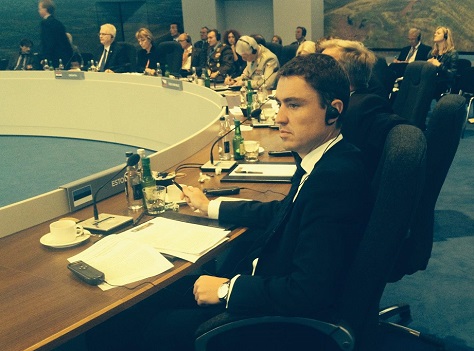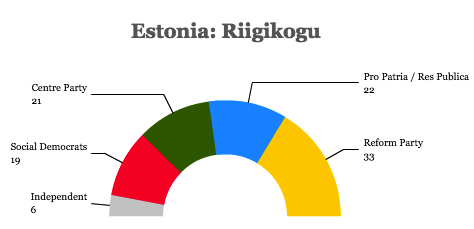With the world’s attention on a political assassination in Moscow, voters in the former Soviet republic of Estonia go to the polls tomorrow, March 1, with the threat of Russian aggression looming on its eastern border. ![]()
Three days ago, US troops, as part of NATO exercises, paraded in Narva, one of Estonia’s largest cities, resting on the Russian border, and Russian troops reciprocated with a similar show. Though it felt like a Cold War throwback, the demonstration highlights just how seriously Estonia, a member of NATO since 2004, and other NATO allies are taking the possibility of a Russian incursion in the Baltics.
Under that tense penumbra, voters will elect all 101 members of Estonia’s parliament, the Riigikogu, where the center-right Eesti Reformierakond (Estonian Reform Party) currently controls the largest bloc of seats and governs in coalition with the centrist Sotsiaaldemokraatlik Erakond (Social Democratic Party).
Some polls show, however, that the center-left Eesti Keskerakond (Estonian Centre Party) narrowly leads the Reform Party, with the Social Democrats and the conservative opposition party, Isamaa ja Res Publica Liit (IRL, Pro Patria and Res Publica Union), trailing close by in third and fourth place.
It’s the first time that Estonia’s youthful new prime minister Taavi Rõivas (pictured above) will lead the Reform Party into an election. When longtime prime minister Andrus Ansip stepped down in March 2014 after nine years in office, the idea was that he would switch jobs with former Reform Party leader, prime minister and European commissioner Siim Kallas. That worked out for Ansip, who’s now Estonia’s representative to the European Commission with a ‘super-portfolio’ for the digital single market.
Kallas, however, was tripped up by a scandal dating to his days as Estonia’s central bank president in the 1990s, and he stepped out of consideration for the premiership. Other heavy hitters like former foreign minister Urmas Paet also demurred. That meant that the challenge fell to the 35-year-old Rõivas, whose government experience included just two years as social affairs minister. Married to pop singer Luisa Värk, Rõivas has been a member of the Estonian parliament since 2007 and is generally seen as close to Ansip.
The Centre Party’s leader, Tallinn mayor Edgar Savisaar, is nearly three decades older, and he served briefly from 1991 to 1992 as Estonia’s first independent prime minister. During the campaign, he’s made much of Rõivas’s relative inexperience. Continue reading Russian threat dominates Estonian election campaign

